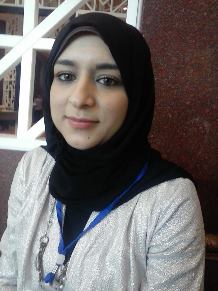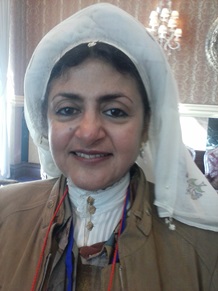GCC: In search of a vision
Six Gulf scholars spoke with Al Jazeera about the challenges facing the Gulf Cooperation Council.

The Gulf Cooperation Council (GCC) countries are meeting at a time of great upheaval and change in the world’s economic structure in the fields of energy, commerce and technology.
Al Jazeera interviewed six Gulf scholars about the key challenges facing the Gulf countries domestically, regionally and internationally.
| Lulwa Rashed al-Khater, public policy expert, Qatar |
 |
| Lulwa Rashed al-Khater [Al Jazeera] |
The key challenge is the question of how do we define sovereignty as separate states and collectively. The question about sovereignty is also about security on all levels; political security, economic security, food and water security.
So domestically, for example, if you ask why don’t we have one currency, why don’t we take serious steps towards economic integration? I think different countries have different views about how do they define their own territories, economically, politically, geographically and so on.
And this is – again – very much related to the question of sovereignty. And if we take it regionally, the main challenge is about having this common understanding of what is tactical and what is strategic.
I think that the way we are reacting to what is happening in the Arab region is mixing up priorities of what is tactical again and what is strategic?
Unless we have this common understanding, I think not only the GCC is at risk, but the whole Arab region is at risk, because this is the first time in the modern history of the Arab region that the GCC becomes the centre of gravity of political action, an agent of change in the region.
And with this sort of, I would say, randomness towards different issues in different countries in the Arab region specifically, I think we are putting ourselves at serious risk.
Now, internationally again, this is a question of how do we strike a balance between the interest that the world has in this region, because of what is perceived to be the custodian of the Islamic religion, and above all because of the resources, and our own interests.
So we need to have a balance between our interests, and the interests of other countries, let’s say our allies in the world. We shouldn’t compromise our own interests. So these are in simple terms the challenges the GCC is facing.
| Dania Thafer, PhD candidate, Kuwait |
 |
| Dania Thafer [Al Jazeera] |
Domestically, one of the key issues is the youth bulge, that is, a large percentage of population that are young.
This should be addressed from different perspectives: from an economic perspective, where there needs to be an adjustment for the market to accommodate this youth bulge, and for the economy to shift to a knowledge-based economy since [much of the] GCC is still dependent on the hydrocarbon resources when the world is moving to shale gas resources.
Interlinked to this issue is education. If you look at the current [education] system, a lot of it is based on rote memorisation.
I think there needs to be more emphasis on understanding concepts and ideas to think fluidly and to have a knowledge-based economy.
With regards to the region, unity is a key issue to face the challenges so a sense of unity among different groups within the country and among GCC countries is much needed.
On the international front, I would argue that the largest concern is oil prices, the drop of oil prices. Reform is another key issue, it does not have to be from bottom up but the idea of creating certain institutions that can accommodate the changes in the demographic situation should be addressed.
Also I think the key area to address the youth from a government perspective is institutions that can accommodate the demands and concerns of youth and communicate those demands and concerns to the leadership.
[In regards to] why many youth from this part of the world join so-called jihadist groups, my understanding when you look at young men, they have this idea of going to war as a romantic issue. Another thing is the boredom, we have a lot of young men who are bored, they cannot find jobs and simply do not have a lot to do with their time and this obviously creates serious problems.
| Nasser Ahmed Bin Ghaith, researcher, United Arab Emirates |
 |
| Nasser Ahmed Bin Ghaith |
The key challenge facing the GCC is vision, or lack thereof. It is a cultural problem.
We do not have an answer to major questions like identity questions, what political model, economic model we are after. These are all unanswered questions.
The main problem with the GCC as a regional institution is that it was an institution aimed to fulfil security and political objectives, but they were using an economic model to achieve this.
You begin with customs union, the common market and then common currency. Well that is an economic model, it worked fine with Europe because Europe decides to modernise and neutralise politics and focus on economics.
The GCC, on the other hand, wanted political objectives and security objectives but they are using an economic model and that is why it did not really work and it never worked.
On the national front, political reform is a key issue. It should be a bottom-top approach. It is about demands from the public, which put pressures to reform. The problem with the GCC – and most Arab nations – is that political reform was not a bottom-top approach; rather, it was an ultra-top approach, ie from international powers.
The Greater Middle East Initiative is an interesting case in point here. It is the first time in history that a sovereign nation would demand another sovereign nation to give its citizens their political rights and it is an insult that American politicians are asking my leadership to give me my rights.
Sectarianism is another key challenge but it takes us back to the fundamental question of identity, of who we are. It is a vision problem which hindered us from answering questions with regards to identity.
It is not a grassroots problem, it is not a Shia individual or a Sunni individual. It has never been an issue in this region ever. It is being made an issue by regimes in crisis.
| Meshari al-Ruwaih, researcher, international relations, Kuwait |
 |
| Meshari al-Ruwaih [Al Jazeera] |
They are all connected; we cannot talk about domestic challenges without talking about regional and international ones.
On the domestic front, it is political reform – this seems to be an institutional platform where GCC states can face regional and international challenges.
The major challenge will be political reform, to create more institutions, rule of law, put institutional constraints on the individual style of policy-making; of course, the GCC countries have varied political experiences.
Also questions of succession or representation, the ageing leadership, and the tribal-based mode of governance. The problem is not just at the state level, but also at the society level as well, since this type of governance seems to be acceptable by the population in the Gulf.
In my view, however, this tribal style is not sustainable for both states and societies in the Gulf region.
Another key issue has to do with what I call a vacuum of moral authority. By that I mean, the lack of a regional order that could be a frame of reference for all countries of the region and where there is a collective will between states to offer a regional order.
Groups like ISIL and al-Nusra Front tried to fill this vacuum by saying: “We are here to protect the people.” So unless GCC states are willing to fill this vacuum, this will be their biggest regional challenge.
If they are looking for leadership, they cannot go on promising security and economic development, because this has short-term value. There is no normative dimension to this model and it is not sustainable.
In that sense, a country like Iran might not be perceived as a threat. Given the way Iran and Saudi Arabia, United Arab Emirates and Egypt are looking at the future, I think there should be a lot of mutual interests; more than conflicts between the two sides.
If Iran goes along with this model of security and economic development, and it looks for more material interests, then I do not see any conflict between the two sides.
| Khaled al-Dakhil, professor of political sociology, King Saud University, Saudi Arabia |
 |
| Khaled al-Dakhil |
The key questions here are about sectarianism, the shift in US policy towards the region and the question of reform.
These issues must be considered very seriously, especially after the Arab Spring and its huge ramifications throughout the region. That is so far the four challenges.
While originally sectarianism is an internal issue, however, after the US invasion of Iraq in 2003 and spread of Iranian influence, it became a regional challenge, which means that the internal situation affects the external and vice versa.
For example, Iran’s regional policies and its dependence on military militias is bound – of course – to instigate reaction from Arab countries. That is how the external affects the internal, and then you get into this vicious circle of action and reaction.
The question of reform, basically political and constitutional reform, should be addressed. The Arab Spring was about having the people – in each Arab country – be a major player in the politics of the country, participate in the political process, so reform should take this notion into consideration. The political process should be changed to accommodate this newcomer.
Constitutional reform should recognise the importance of taking this point into consideration and allowing the people to participate in the political process.
Daesh [ISIL] is very brutal and savage, yes, but I do not think it is going to be a threat in the near future if the US and the Arab states have a political plan besides the military plan they are executing now – then Daesh will not be a threat.
The problem is they do not have a political plan. Fighting Daesh alone is not going to solve the problem because it is part of a larger problem called sectarianism and you have to have a plan against sectarianism in its Shia and Sunni manifestations.
As for the succession issue, I would say that it will not be resolved unless it is settled down on the basis of constitutional principles and consensus in society, then you can say it is resolved. But to leave it on the basis of tradition as it used to be, so far that was successful in the past, but does not guarantee that this will be the case in the future.
| Hatoon Ajwad al-Fassi, historian, King Saud University, Saudi Arabia |
 |
| Hatoon Ajwad al-Fassi [Al Jazeera] |
I think the GCC has a problem with appropriating its corporation within the new format of international and regional changes.
There are new coalitions taking place between the US and China, new powers rising from east and west, you have very hard challenges affecting the Gulf region from the north and from the south. We talk about Iraq, Yemen; from the east, there is Iran.
It is making the Gulf alert all the time, trying to prove themselves as a stable region, as a region that is escaping the Arab Spring, successfully; trying to prove that monarchical systems are the best to preserve stability. At the same time, they have issues that they need to face, starting with terrorism, sectarianism, human rights, youth, unemployment, to name the ones on top of the list.
There is also the question of democratic representation of the public. It is still very restricted, still at a very superficial level. There is a problem of freedom of expression, and sectarianism poses a major threat.
The incident that took place last month in al-Ahsaa in which eight Saudi Shia were killed, was the first attack on the Shia population. The dangerous part, however, when you have Abu Bakr al-Baghdadi, the ISIL leader, in his latest speech, sending a message to his followers to attack Shia – and since a large number of Daesh supporters are Saudis, the country finds itself in a very dangerous situation.
I also find the women issue to be a key challenge in this debate. The main challenge of women in the Gulf is their full citizenship, which is under lots of, not attack, but under challenge. Women do not have the right to pass her citizenship to their children or her husband.
In Saudi Arabia, the issue of citizenship becomes a minor problem compared to other more pressing challenges like the challenge for women to have a full legal capacity and not be treated as second-class citizens. And there is also the challenge of unemployment, because the majority of the unemployed in the Gulf region are women, highly qualified women. We are talking about 70 percent.
In Saudi Arabia, you have a bit over 600,000 women working out of 10 million Saudi women. So only less than 10 percent are working. Work is a major, major issue here, and women are absent from decision-making on all levels. The only public participation that is available now is Majlis al-Shura [Shura council] where you have 30 women, but still we have a long way to go.